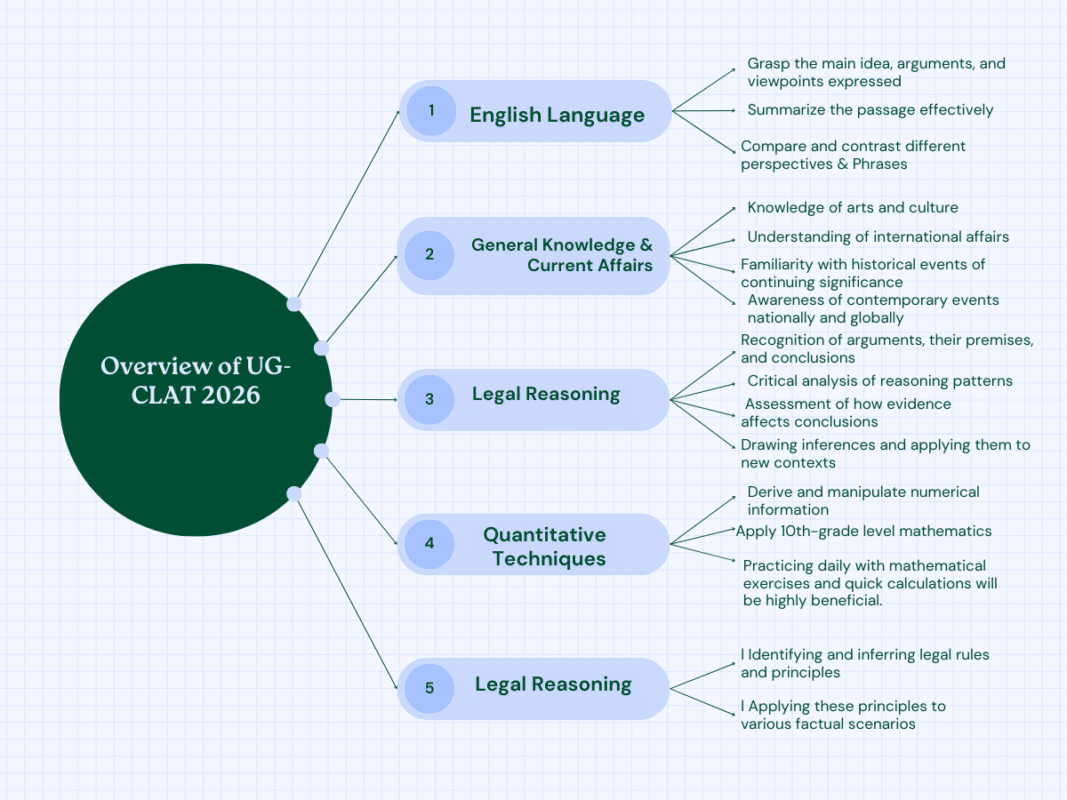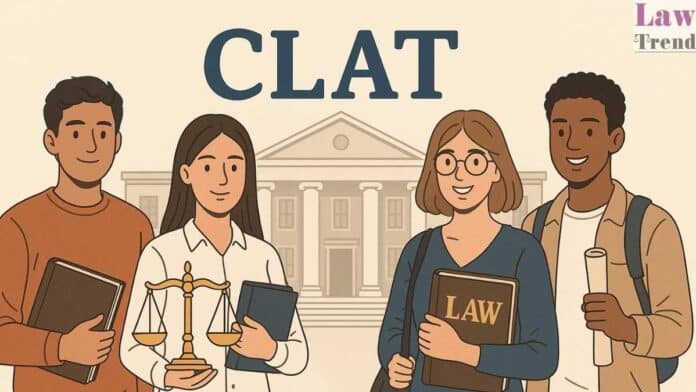Preparing for the Common Law Admission Test (CLAT) is a crucial step for students aspiring to study law at India’s top National Law Universities (NLUs). The CLAT syllabus for 2026 emphasizes comprehension and reasoning abilities, aiming to test the aptitude and skills essential for a legal education. It is important for candidates to recognize that the focus is not on rote learning or prior legal knowledge, but rather on a deep understanding of language, logic, and current affairs.
Let’s dive into the detailed overview of the CLAT syllabus for 2026, understand what each section demands, and discuss how strategic preparation — possibly with the help of expert CLAT coaching from LegalEdge — can make a real difference.
Overview of UG-CLAT 2026
The UG-CLAT 2026 will be a 2-hour exam consisting of 120 multiple-choice questions, each carrying one mark. There will be a negative marking of 0.25 marks for every incorrect answer. The questions will be distributed across five key subjects:
- English Language
- Current Affairs, including General Knowledge
- Logical Reasoning
- Quantitative Techniques
Understanding the expectations for each section is crucial for effective preparation.

Section-wise Breakdown of the CLAT Syllabus
English Language
In this section, candidates will encounter passages of around 450 words sourced from contemporary or historically significant fiction and non-fiction writing. Designed for a 12th-grade reading level, each passage is followed by comprehension-based questions that test your ability to:
- Grasp the main idea, arguments, and viewpoints expressed
- Draw inferences and conclusions
- Summarize the passage effectively
- Compare and contrast different perspectives
- Interpret the meaning of words and phrases in context
Current Affairs Including General Knowledge
This section also features passages (up to 450 words) derived from news articles, journalistic reports, and non-fiction writing. Candidates must demonstrate:
- Awareness of contemporary events nationally and globally
- Knowledge of arts and culture
- Understanding of international affairs
- Familiarity with historical events of continuing significance
Though some questions might involve legal information, no prior legal knowledge beyond the passage is necessary.
Legal Reasoning
Legal Reasoning will test your ability to handle passages about fact situations, public policy issues, or moral-philosophical questions. Key skills required here include:
- Identifying and inferring legal rules and principles
- Applying these principles to various factual scenarios
- Understanding how changes in rules may affect outcomes
While no formal legal education is required, a general awareness of legal and moral issues will enhance your ability to interpret and apply the information provided.
Logical Reasoning
In Logical Reasoning, candidates will work through a series of short passages, each followed by questions designed to evaluate:
- Recognition of arguments, their premises, and conclusions
- Critical analysis of reasoning patterns
- Assessment of how evidence affects conclusions
- Drawing inferences and applying them to new contexts
- Identifying analogies, contradictions, and evaluating argument strength
- Developing strong critical thinking skills is key to excelling in this section.
Quantitative Techniques
This section presents short sets of facts or numerical data, followed by related questions. Candidates must:
- Derive and manipulate numerical information
- Apply 10th-grade level mathematics (ratios, proportions, basic algebra, mensuration, and statistics)
- Practicing daily with mathematical exercises and quick calculations will be highly beneficial.
How to Prepare for UG-CLAT 2026
LegalEdge will offer several preparatory materials, including:
- Guides to the question paper and sample questions
- Model question papers
- Instructional materials for each subject
Candidates who complete their applications will gain access to a learning platform containing these resources, along with performance-tracking tools and model test scores. LegalEdge also plans to organize online sessions where subject experts will guide candidates on preparation strategies for each section.
However, self-study alone may not be enough for everyone. This is where professional CLAT coaching from LegalEdge can provide structured guidance, help in understanding complex concepts, and offer regular practice through mock tests and doubt-clearing sessions.
Practical Tips for CLAT 2026 Preparation
- Read Regularly: Develop the habit of reading quality newspapers, editorials, and periodicals to enhance comprehension and stay updated on current affairs.
- Practice Quantitative Skills: Revisit your 10th-grade mathematics textbooks and practice solving problems to boost speed and accuracy.
- Stay Informed: Regularly follow national and international news to build a strong foundation for the Current Affairs section.
- Solve Sample Papers: Regular practice with mock tests and model papers aligned with the CLAT syllabus will help build exam temperament.
- Work on Speed and Accuracy: Since the exam is time-bound with negative marking, practicing under timed conditions is crucial.
Conclusion
Understanding the CLAT syllabus thoroughly is the first step toward a successful preparation strategy. It allows aspirants to focus their efforts wisely and avoid wasting time on irrelevant topics. As competition gets tougher each year, being systematic, disciplined, and strategic becomes essential.
Partnering with reputed CLAT coaching institutes like LegalEdge can further sharpen your skills, offer valuable exam insights, and boost your confidence. Begin your journey with a clear understanding of what the exam demands — and take each step towards your law school dream with focus and determination.




